Allotment chicken keeping
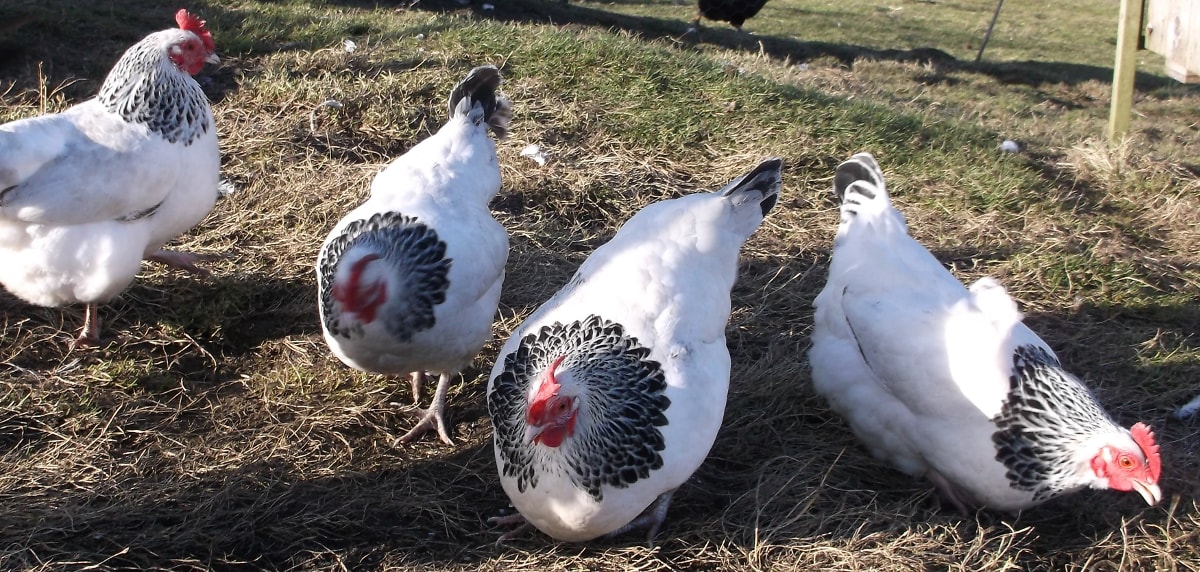
The complete guide to allotment chicken and poultry.
Table of Contents
- Can you have chickens on an allotment?
- How many chickens are you allowed on an allotment?
- Are chickens considered livestock in the UK?
- Is the allotment big enough for chickens?
- Problems with allotment chicken keeping:
- How do you keep chickens on allotments?
- What are the best chickens for an allotment?
- Can you free range chickens on an allotment?
- Will chickens ruin an allotment?
- Can you raise meat chickens or broilers on an allotment?
- What are the allotment holder responsibilities?
- Allotment chicken coops:
- Allotment chicken keepers resources:
Can you have chickens on an allotment?
You are normally allowed between 5 and 12 hens on allotments. Notice that is hens and not cockerels and certain rules and procedures must be followed.
Under the terms of the often quoted 1950 Allotment Act, the keeping of hens and rabbits is permitted on allotments and viewed as an allotment holder's right, so long as they are for the tenants own use and not for business or profit.
The reality can be quite different these days, Allotments are managed by councils, farmers and private land owners and they are allowed to set some rules.
Chicken coops and runs, depending on their size may require planning permission.
It is also not a universal right any more that covers all allotment land, especially the new plots that may be managed by local landowners or parish councils.
Always check your tenancy agreement, and the local legislation, before investing in any rabbits, poultry, bees or any other livestock for your allotment.
How many chickens are you allowed on an allotment?
Between 5 and 12. You normally need to apply to the council or land owner for permission and in some cases you may need planning consent for the chicken coop.
Below: The application for consent to keep hens or bees on allotments on my local council website.
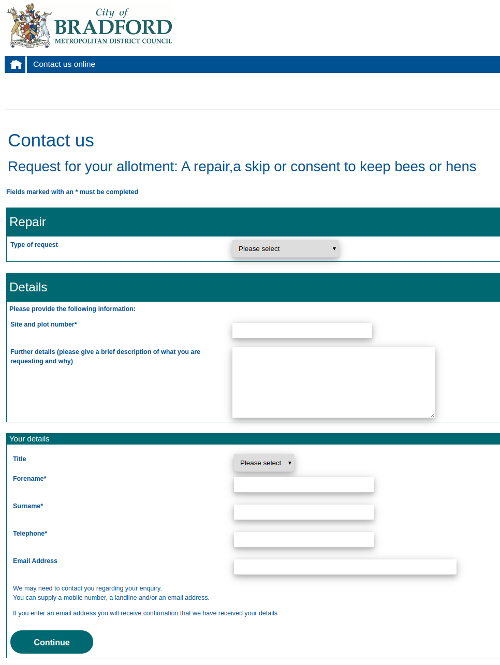
When referring to chickens, the law means the female of the species and excludes cockerels, although my local council used to allow the keeping of a single cockerel with hens, subject to noise controls.
Are chickens considered livestock in the UK?
Yes, chickens are considered to be livestock and they are covered by the Animal Welfare Act 2006, and others, and need to be looked after properly and are given certain rights.
- a suitable environment (place to live)
- a suitable diet
- to exhibit normal behaviour patterns
- to be housed with, or apart from, other animals (if applicable)
- to be protected from pain, injury, suffering and disease
You could also fall foul of the food standard agency if you don't feed birds properly or feed them illegal feed-stuff like mealworms and kitchen scraps.
It used to be that backyard chickens in small numbers were exempt from the legislation but this is not the case any more.
Is the allotment big enough for chickens?
What size an allotment is has a lot of impact on whether you can keep hens.
There has been a problem in recent years as councils have got rid of allotments, the ones that are left end up getting sub divided so more holders can be catered for on the same land. Chickens need a minimum amount of space and this is becoming a problem for new holders wanting to get some birds.
You will need a completely enclosed coop and run to keep chickens on an allotment, allowing them to free range on their own will be a recipe for disaster.
Below: A sturdy and secure coop and attached run for up to six hens.
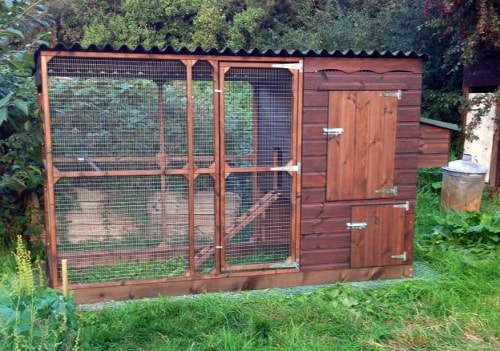
My local councils rules also state that you are not allowed to use more than 20% of you plot to keep livestock which is fine if you have a large plot like I do but more of a problem if you don't.
Problems with allotment chicken keeping:
Problems crop up all the time.
- Other plot holders and neighbours.
- Watching them. I would be concerned about my chickens if they were somewhere I couldn't see them at least once a day to check on them.
- Never underestimate people. I guess the number one consideration is security, allotments can attract local troublemakers sadly.
- Predators. The pop hole would need to be shut at night if the run wasn't fox proof.
- Theft. I'd personally advise against having a very expensive coop or desirable pure breed chickens on an allotment.
- Escapees. Chickens can decimate plants very quickly, so I'd be worried about the chickens having an "all you can eat buffet" at a neighbouring plot.
- Vermin on the allotment site will always be the chicken keepers fault..
They'd still need daily attention and even twice daily in frosty weather just like garden hens.
What are the best chickens for an allotment?
Cheap plain brown egg layers are the best chickens for the allotment. They are a good size, easy to tame and look after and never stray far from the food.
Below: Best get ordinary plain brown hybrid layers like these for allotments.
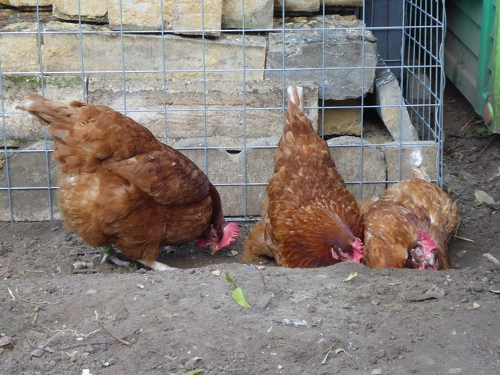
Plain Lohmann brown or hylines are also very productive as you have limited numbers.
Can you free range chickens on an allotment?
I would not recommend unsupervised free range with allotment hens. Chickens are not that intelligent but they are naturally inquisitive, and love to look around, exploring their surroundings and scratching at the soil to see what they can unearth.
If that scratching and unearthing is another plot holder seedlings or seed then it likely to lead to confrontations.
They can get frustrated and bored if their surroundings are not well kept, which can lead to them fighting or becoming ill.
Allotments vary on rules about chickens, so it would be a good idea to check that you are allowed to free range them, it may not be allowed.
Will chickens ruin an allotment?
In a heartbeat if they get out. Six chickens will cause havoc on an allotment. Just imagine six hens all having a dust bath in the vegetable beds.
As if to prove a point, here is one in the lovely warm sunshine, in the beans!
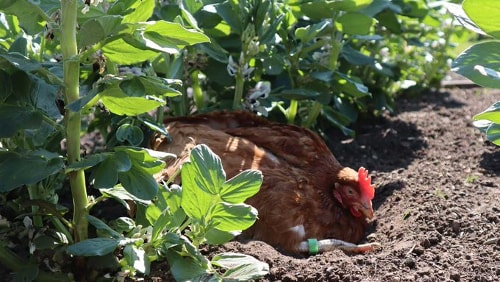
Can you raise meat chickens or broilers on an allotment?
Yes, although I would not slaughter or process one on an allotment. Killing and plucking will raise a few eyebrows and cause some shed window curtain twitching!
What are the allotment holder responsibilities?
Allotment plot holder have certain responsibilities set out in law.
- Under the terms of the 1950 Allotment Act, the keeping of hens and rabbits is permitted on allotments and viewed as an allotment holder’s right, this is only so if they are for the tenant’s own use, and not for business or profit.
- In some instances, private landlords may have included a clause prohibiting the tenant from keeping animals on the plot.
- If any animal on an allotment is deemed a nuisance, health hazard or their well-being is affected then they can be removed.
- All livestock is subject to strict welfare codes enforced by the RSPCA and DEFRA and covered by the Animal Welfare Act.
- You are responsible for the control of vermin.
- They animal pens must be cleaned regularly.
- All necessary fire precautions must be taken.
- All birds must be inspected at least daily.
- Any sick or injured birds must be removed immediately and the correct and appropriate treatment provided
- The tenant must allow the Allotment Officer and/or an animal welfare representative to inspect the hens at any time.
- You are responsible for any damage your hens do to other plots.
Allotment chicken coops:
As a rule the best type of coop to have on an allotment is an all-in-one with the run attached or a movable ark.
Below: A good set up, raised coop with walk-in wire mesh run and slabs all around to help prevent tunnelling under the fence.
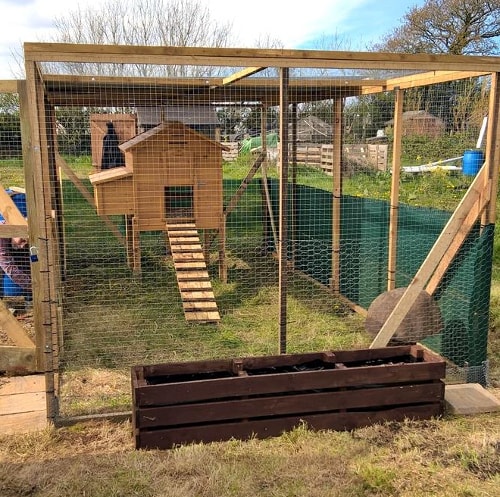
Avoid cheap light weight chicken coops like this one.
Allotment chicken keepers resources:
